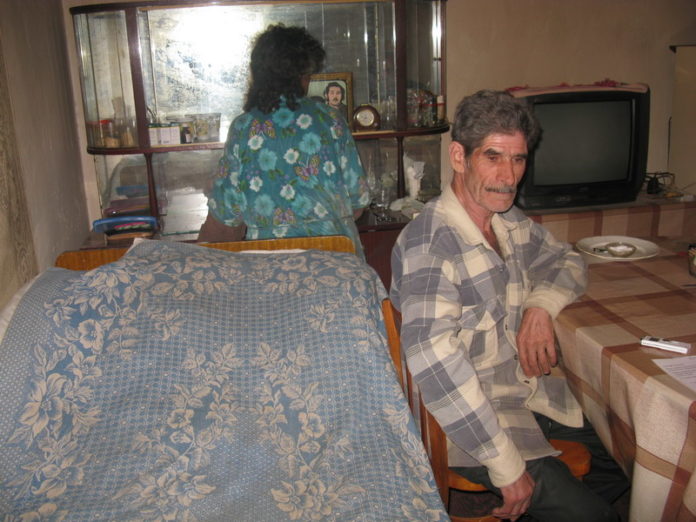69-year-old Tofik is in despair. He no longer dreams of ever having a chance to meet his nine brothers and sisters whom he hasn’t seen for about 20 years. Last time he visited his parents’ house in his native village before the war.
His eyes filled with tears when he started to name his brothers and sisters: Mirza, Fazilla, Aghamirza, Mirza-agha, Hagigat, Tahir, Rovshan, Farhad. When I asked him whether he dreams of his relatives, he started to sob.
“I see Mirza, my father and mother in my dreams,” he said coping with his emotions, then went on to pouring tea into transparent glass cups that people usually drink tea from in the Muslim East.
Tofik Aliev is one of those Azerbaijanis living in Nagorno Karabakh who make no secret of their nationality, nor change their surnames, and mark their nationality as Azerbaijani during the census. Tofik lives in a small and simple single-room apartment in the city of Askeran in Nagorno Karabakh, with his Armenian wife Valentina Alieva (this woman changed her “Tovmasyan” surname after the wedding and took her husband’s surname).
According to the official data, there are about ten Azerbaijanis living in Nagorno Karabakh; yet representatives of some NGOs note that their number accounts for about a hundred including those with an Azerbaijani mother or father. Some of them occasionally exchange letters with their relatives through the Red Cross.
Tofik Aliev, however, is not one of those lucky people. “Our native village Gyulabend in Ujari region is about 150 km away from here. If I go there, I might not recognize many of the village people. I might not recognize even my own nephews and nieces,” he says. Tatul Shekyan, a doctor living in Askeran, has been the chief doctor in the regional hospital for a long time, and then he held the post of Askeran mayor for three years. He knows the Alievs who settled in the city very well.
“We didn’t communicate much before the war, just greeted each other every day. During the wartime I worked with Valya, and after that I started to see them more often. Tofik is a wonderful, very simple and hard-working personality. I helped this family so that they didn’t feel lonely,” Shekyan said.
The Alievs have no fixed-line telephone at home. Valya thinks this is reasonable. “What do we need a phone for? We have no relatives,whom should we call?” Her parents deceased long ago; her brother died in an accident in Tashkent when he was young.
The Alievs survive on a state pension. They also have a land plot but can not cultivate it due to their age. They do not leave Askeran; Tofik Aliev said he visited Stepanakert several times many years ago but he has never been to Yerevan.
Armenians and Azerbaijanis who left their relatives on the opposite side of the contact line have nearly the same attitude to the war, life, and the future. Generally speaking, the war turned their lives upside down.
60-year-old Azerbaijani Elmira living in the village of Berdashen in Martuni region of Nagorno Karabakh has equally suffered both from Armenians and Azerbaijanis. She met her future husband Slavik in her native city of Baku about 40 years ago; she married him and moved to Berdashen.
Like Tofik, Elmira didn’t know a single word in Armenian when she settled in Nagorno Karabakh. Now she speaks perfect Artsakh dialect, and her language is perhaps even clearer than that of the locals who use many Russian words or suffixes.
Elmira’s mother was against the marriage of her 17-year-old daughter with an Armenian. At first Elmira didn’t know that the young man who demonstrated Indian movies in one of Baku cinemas, and with whom she was destined to fall in love, was an Armenian. Today she doesn’t regret having married Slavik, left Baku and settled in this remote mountainous village of Berdashen. But she bears a grudge against her fate.
“We had five children. An Armenian guy killed my 17-year-old daughter because of jealousy. Azerbaijanis killed my son during the war. This war changed my life.”
Elmira used to exchange letters with her sisters in Baku through the Red Cross. These letters informed her about her mother’s death. The same letters told her that one of her nephews died in a car accident.
Several months ago Internews shot a film about this family. The film included episodes from the romantic Indian movies that Slavik once showed in Baku for his future love, 17-year-old Azerbaijani Elmira and others.
“Our life resembles a movie,” says with a kind smile the woman who has suffered much in her life.
Tatul Hakobyan
This article first was published on 17th March, 2011 in Medialab.am













